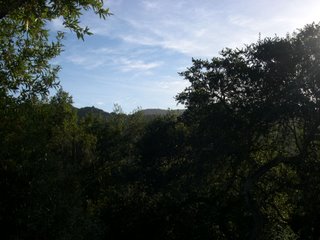More from Cal-i-for-ni-a


First, some photos. These is from the chair at my brother's table (kitchen/dining room) where I sit while doing my work here in fabulous San Rafael (and I walked over to the wall o'windows to take one, too)
So that's pretty nice.
I'm on to the "media" part of my trip now - or maybe I should say the framing part. First, thanks to Anat Shenker-Osorio, who works with Real Reason in SF, I went to a presentation by Alan Jenkins, who works with a NY-based organization called The Opportunity Agenda. Both Real Reason and the OA work with the concept of framing, though in different ways. I met with Anat afterward; she explained the cognitive-based model that they use (which is related to the work that comes out of the Rockridge Institute). I think OA's approach is more culturally-situated, but I'll learn more tomorrow (because I'm seeing Alan Jenkins again, this time with people from The SPIN Project - and then I'm meeting them afterward).
What all of these people/orgs have in common (which also stems from Rockridge in many ways) is the idea of working in a framework that reflects important values (like "opportunity"), and works toward a positive (this is the "don't negate the frame" idea). For a lot writing-related purposes, for ex., a framework like "opportunity" can work really well in some ways.
But for other writing-related purposes - like plagiarism-related stuff - "opportunity" doesn't work as well. So part of our challenge is to figure out a variety of frames, and then choose from them.... Hey! That sounds *just* like the ways we talk about writing! Hmm. But of course, a *bigger* part - a MUCH bigger part, in fact - is to develop some win-able campaigns that these frames represent, and to make SURE that we have data to support the claims we make in those campaigns.
I also spent a lot of time in the past couple of days thinking about the work of the organizer from the Industrial Areas Foundation who I observed. It's all related, of course. The IAF works very much on cultivating grass-roots leaders. They don't identify issues; they have issues come from individuals and then work to link those together. And they work from stories, stories, stories. This is a very, very effective strategy for building a broad and super diverse base, I think. There are elements of the model that can change - maybe in subtle ways, maybe not-so-subtle - the ways that we work on WPs. For ex., what would it look like to "do a round" at the beginning of every meeting and ask everyone to tell one story about why the find this work cool? And then, from there (not at every meeting...) to ask people: what fires you up? What makes you angry? (The IAF works a lot on passion, and passion is always linked to anger...) Then you get a good list going, and everyone can vote on what they want to focus on, then develop campaigns from there. They might take what the IAF calls "research actions" - actions to gather more data or investigate issues - and certainly would take some strategizing. The idea, too, is to involve others -- not have the organizer (or WPA) do the driving. Sure, we might not get to the issues that the WPA thinks are absolutely key to address... but we would get to issues that came up from others, and others would likely be a lot more involved, because they would be leading. It's not hugely different from what a lot of us do, but it puts it in a broader context, and then the framing/publicity piece can be useful to advance things. Anyway - that's what I'm thinking thus far, anyway.
When Eleanor, the IAF organizer, and I were chatting today, we also were talking about the state of things in this somewhat depressing world more generally. All we can do is keep doing this work, right? Because climbing into bed and pulling the sheets over our heads... that's a bad option. Right? Right.


